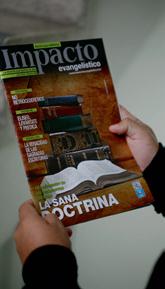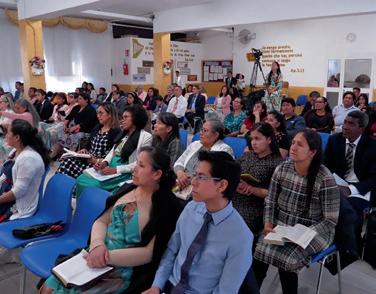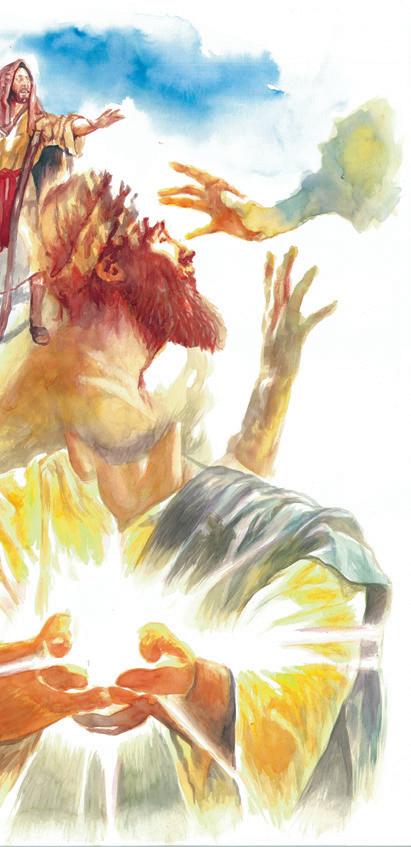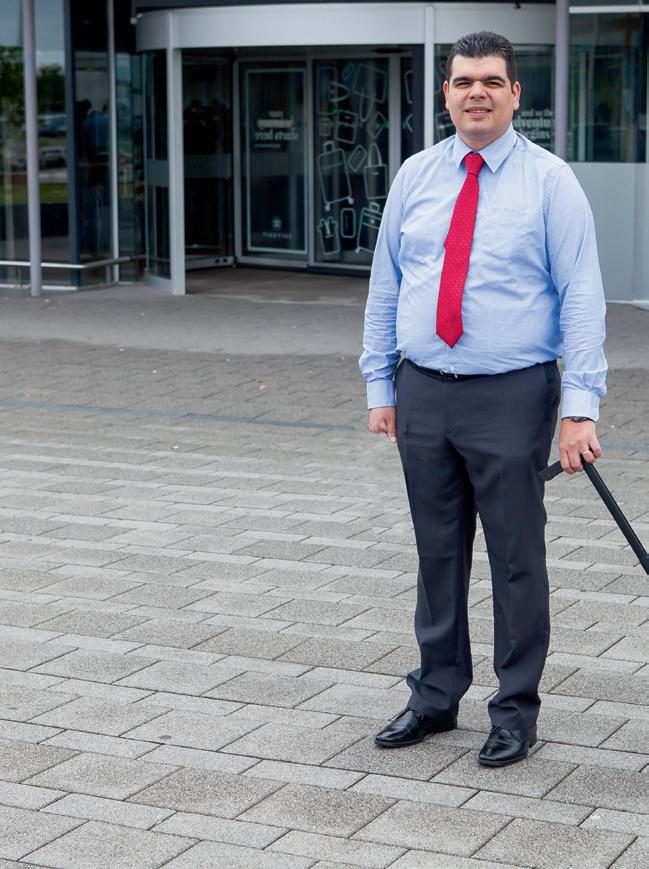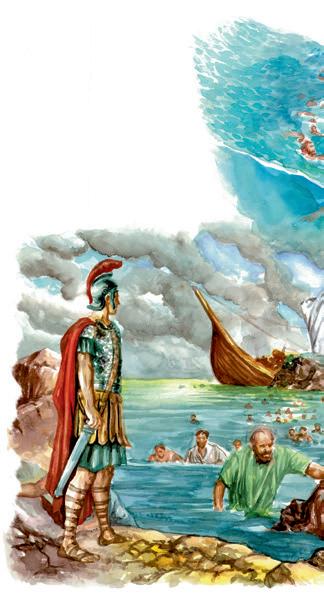
6 minute read
Hero of faith HOW CAN I KEEP FROM
from 787_English
HOW CAN I KEEP FROM SINGING? HERO OF FAITH
Henry Hall
Advertisement
Reverent Robert Lowry was a talented musician and preacher that spread the Word through his sermons and more than five-hundred hymns. With a unique vision of the Gospel, he is an all-time reference of Christian music.
Robert Lowry also learned about gospel music and hymnology to serve the Lord, and today he is renowned for his fruitful musical ministry. With his extraordinary talent and creativity, he wrote many inspired hymns.
The name of Rev. Robert Lowry is a familiar one in almost every home where gospel songs are sung. The mention of his name brings up emotions of affection and pleasure in the hearts of thousands of Christian people who have used his hymns.
Robert Lowry was born in Philadelphia, Pennsylvania, on March 12, 1826. Son of Irish immigrant Crozier Lowry, his fondness for music was exhibited in his earliest years. At the age of seventeen he joined the First Baptist Church of Philadelphia, and soon became an active worker in the Sunday-school as teacher and chorister.
FRUITFUL MINISTRY In 1848 Lowry was encouraged by his pastor, Rev. Geo. B. Ide, D.D., to prepare for a life’s work in the Christian ministry. At the age of twenty-two, he gave himself to the work of the ministry, and entered upon a course of study at the University of Lewisburg, Pennsylvania. At the age of twenty-eight he graduated with the highest honors of his class.
In the same year of his graduation, he entered upon the work of the ministry. He served as pastor at West Chester, Pennsylvania, 1854-1858; in New York City, 1859-1861; in Brooklyn, 1861-1869; in Lewisburg, Pennsylvania, 1869-1875. He then went to Plainfield, New Jersey, where he became pastor of Park Avenue Church. In each of these fields his work was crowned with marked success.
Dr. Lowry was a man of rare administrative ability, a most excellent preacher, a thorough Bible student, and whether in the pulpit or upon the platform, always a brilliant and interesting speaker. He was of a genial and pleasing disposition, and a high sense of humor was one of his most striking characteristics. Very few men had greater ability in painting pictures from the imagination. He could thrill an audience with his vivid descriptions, inspiring others with the same thoughts that inspired him.
While preaching the Gospel, in which he found great joy, was his life-work, music and hymnology were favorite studies, but were always a side issue, a recreation.
When he saw that the obligations of musical editorship were laid upon him, he began the study of music in earnest, and sought the best musical text-books and works on the highest forms of musical composition. He possessed one of the finest musical libraries in the country. It abounded in works on the philosophy and science of musical sounds. He also had some musical works in his possession that were over one hundred and fifty years old.
DETERMINED PREACHER On the death of Wm. B. Bradbury, Messrs. Biglow & Main, successors to Mr. Bradbury in the publishing business, selected Dr. Lowry for editor of their Sundayschool book, “Bright Jewels,” which was a great success. Initially Lowry was opposed to the idea, afraid that it might affect his pastoral and preaching work, but was persuaded. During the following 30 years, Lowry oversaw the production of more than 20 hymnals.
In 1869, Lowry was persuaded by Dr. Loomis, President of the University at Lewisburg, to return to the town in the dual capacity of Professor of Rhetoric at the university. In 1875 Lowry was awarded the honorary degree of Doctor of Divinity (D.D.) by Lewisburg.
In the year 1880, he took a rest of four years, visiting Europe. In 1885, he felt that he needed more rest, and resigned his pastorate at Plainfield, and visited in the South and West, also spending some time in Mexico. He returned, much improved in health, and again took up his work in Plainfield.
When he saw that the obligations of musical editorship were laid upon him, he began the study of music in earnest, and sought the best musical text-books and works on the highest forms of musical composition. He possessed one of the finest musical libraries in the country. It abounded in works on the philosophy and science of musical sounds. He also had some musical works in his possession that were over one hundred and fifty years old.
TALENTED COMPOSER A reporter once asked him what was his method of composition: “Do you write the words to fit the music, or the music to fit the words?” His reply was: “I have no method… The tunes of nearly all the hymns I have written have been completed on paper before I tried them on the organ. Frequently the words of the hymn and the music have been written at the same time.”
The Doctor frequently said that he regarded “Weeping Will Not Save Me” as the best and most evangelistic hymn he ever wrote. The following are some of his most popular and sweetest gospel melodies: “Shall We Gather at the River?” “One More Day’s Work for Jesus,” “Where is My Wandering Boy To-night?” “I Need Thee Every Hour,” “The Mistakes of My Life,” “How Can I Keep from Singing?” “All the Way My Saviour Leads Me,” “Saviour, Thy Dying Love,” “We’re Marching to Zion,” etc.
“Shall We Gather at the River?” is perhaps, without question, the most widely popular of all his songs. Of this Mr. Lowry said: “It is brass band music, has a march movement, and for that reason has become popular, though for myself I do not think much of it.” He also mentioned: “I began to wonder why the hymnwriters had said so much about the river of death and so little about ‘the pure water of life, clear as crystal, proceeding out of the throne of God and of the Lamb.”
GREAT LEGACY Lowry had a gift for oratory which one later commentator described as “spellbinding.” Dr. Lowry said, “I would rather preach a gospel sermon to an appreciative, receptive congregation than write a hymn”; yet in spite of his preferences, his hymns have gone on and on, translated into many languages, preaching and comforting thousands upon thousands of souls, furnishing them expression for their deepest feelings of praise and gratitude to God for His goodness to the children of men. What he had thought in his inmost soul has become a part of the emotions of the whole Christian world.
Close friend of Annie Hawks and Fanny Crosby, and acquainted with singer Ira David Sankey, Robert Lowry never boasted about the success of his musical ministry in favor of Christ’s doctrine. He remained humble when praised for his work. He always used to say that Christian hymns had to be easily understood and to reflect the experiences of its author with inspiring and powerful words.
Rev. Robert Lowry died at his residence in Plainfield on November 25, 1899. Dead, yet he lives and his sermons in gospel song are still heard and are doing good. Dr. Lowry was a great and good man, and his life, well spent, is highly worthy of a place among the world’s greatest gospel song and hymn writers.


